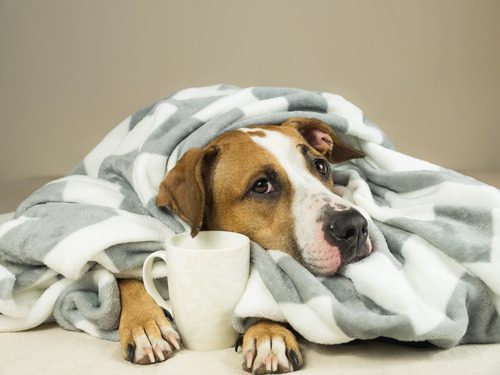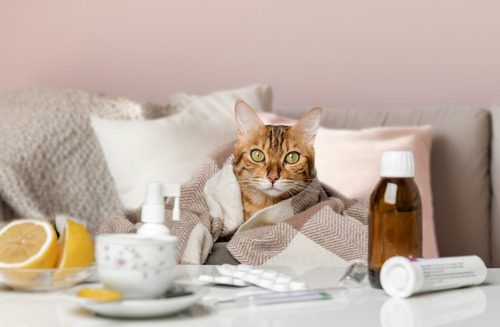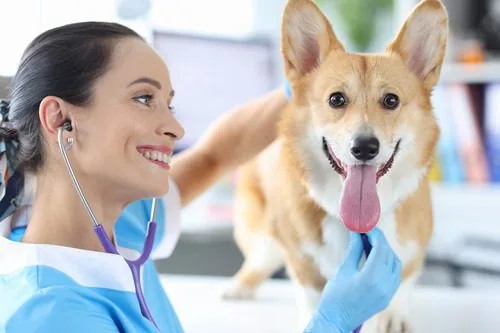When the Mercury Drops
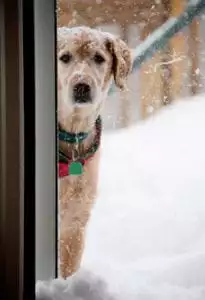 This topic is worth discussing every winter, even if the vast majority of people already know and understand the importance of protecting pets in cold weather. We feel pretty confident that most of our clients already heed the advice that is published each winter by all the pet health organizations, as well as our own website, Facebook page, newsletters, and the Public Service Announcements we run on local cable channels. Each organization and resource of information list, almost identically, very important cold weather pet care tips and health warnings. Unfortunately, there will be a few folks who doubt the danger cold weather poses, or believes their pet is conditioned to withstand the cold weather. We agree, there are many dogs that are more conditioned for the cold. However, there is “cold” and then there is “freezing temps and icy conditions”, which is much different and which both pose serious health risks, such as hypothermia and frostbite. A good rule to follow … if it is too cold for you with a coat, gloves and hat on – then chances are – it is too cold for them. These are the cold weather pet care tips:
This topic is worth discussing every winter, even if the vast majority of people already know and understand the importance of protecting pets in cold weather. We feel pretty confident that most of our clients already heed the advice that is published each winter by all the pet health organizations, as well as our own website, Facebook page, newsletters, and the Public Service Announcements we run on local cable channels. Each organization and resource of information list, almost identically, very important cold weather pet care tips and health warnings. Unfortunately, there will be a few folks who doubt the danger cold weather poses, or believes their pet is conditioned to withstand the cold weather. We agree, there are many dogs that are more conditioned for the cold. However, there is “cold” and then there is “freezing temps and icy conditions”, which is much different and which both pose serious health risks, such as hypothermia and frostbite. A good rule to follow … if it is too cold for you with a coat, gloves and hat on – then chances are – it is too cold for them. These are the cold weather pet care tips:
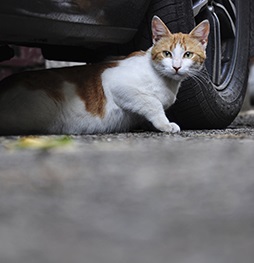 Although some pets are better conditioned to cold weather, you should bring outdoor pets indoors if the temperature drops below 20 degrees Fahrenheit -and it is very important to take into consideration the wind chill factor.
Although some pets are better conditioned to cold weather, you should bring outdoor pets indoors if the temperature drops below 20 degrees Fahrenheit -and it is very important to take into consideration the wind chill factor.
- Puppies, kittens, and short-haired pets should come inside anytime the temperature goes below 40 degrees. They should also be protected when they go outdoors. Consider getting your pet a coat or sweater with a high collar or turtleneck. They should be covered from the base of the tail to the belly. If your puppy is sensitive to the cold consider using indoor training pads. If your dog is sensitive due to age, illness or breed type, take your pet outdoors only to relieve himself.
- If your pet must stay outdoors, be sure to provide adequate shelter for your pet. An acceptable house will have three enclosed sides, elevated off the ground, and contain generous amounts of bedding such as straw or hay. BUT, this is only if they absolutely cannot come indoors, which hopefully does not happen very often – or at all.
- In cold weather, bigger is not always better. A house just big enough for your pet will warm up faster and retain heat better than something that is too big.
- Animals need access to fresh water. Use heated water bowls so that their water does not freeze, and replenish them frequently. Lack of enough water can cause dehydration which can lead to kidney failure.
- Antifreeze is a common and deadly pet poison during colder months. It has a sweet taste to pets, so they will readily lap up any spilled material. If you suspect your pet has consumed any antifreeze at all, contact us immediately – 24-hours a day
- Always wipe the paws of your pets if they have been exposed to areas with ice melts. This can cause blistering on their paws and contains chemicals which are dangerous for pets to ingest. Keep an eye out for limping, excessive licking of their feet and redness to the skin areas between pads.
- Cats should be kept inside in extreme cold. Also, cats love to warm up underneath car hoods. If your car is kept outdoors, or if cats have access to your garage, be sure to pound on the hood of the car prior to starting it. Many cats are killed or severely injured by fan belts and moving engine parts.
- Animals suffer from frostbite and hypothermia just like humans. Consider keeping dogs on a leash when they go outside and make sure they are wearing ID tags. Curious dogs off leash may explore frozen retention ponds, lakes or streams, and fall through the ice into frigid water.
- Pets should NEVER be left alone in vehicles. Leaving a pet in a vehicle is always dangerous, and in cold weather it increases the potential for carbon monoxide poisoning or hypothermia.
- Older pets may suffer more from arthritis during these months. Outdoor exposure should be limited during extreme weather.
- Monitor all pets around wood-burning stoves, fireplaces, electric blankets and space heaters. These can cause severe burns.
Recent Posts
About The Village Vets
The Village Vets is a network of animal hospitals based in Atlanta, GA and the surrounding area. We offer honest, excellent service to our clients in a comfortable, friendly atmosphere. To learn more about our locations and how we can better serve you and your pet, click the button below.
Share This Post
Recent Posts
About The Village Vets
The Village Vets is a network of animal hospitals based in Atlanta, GA and the surrounding area. We offer honest, excellent service to our clients in a comfortable, friendly atmosphere. To learn more about our locations and how we can better serve you and your pet, click the button below.

